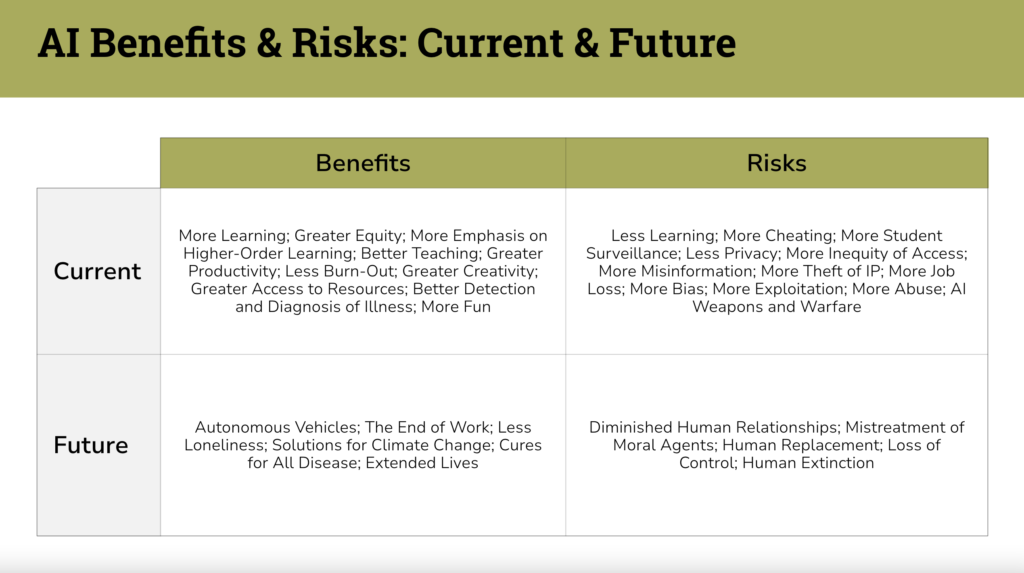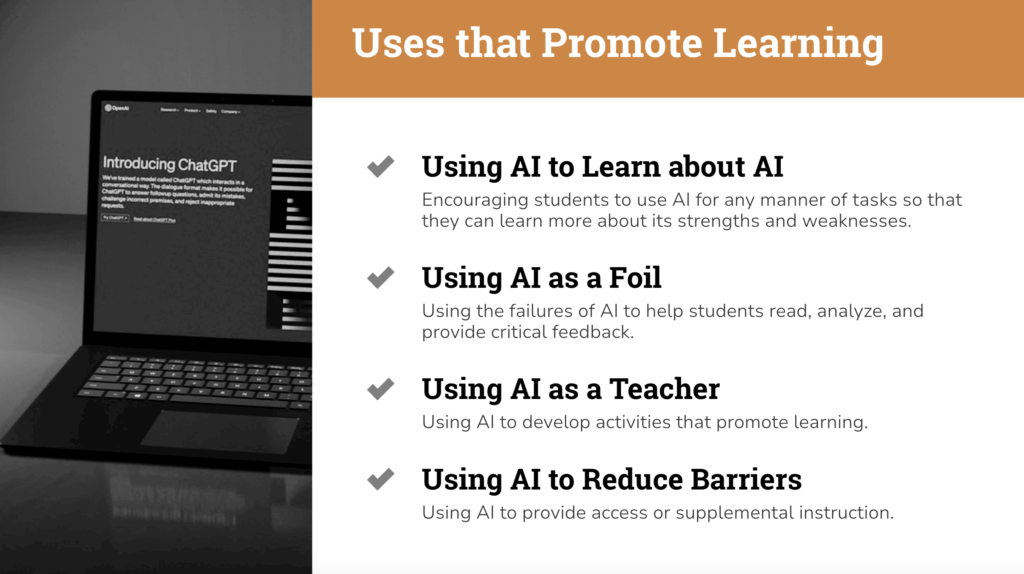The CAT helps faculty explore evolving AI technology
January 17, 2024
Last week, Wake Forest University’s Center for the Advancement of Teaching (CAT) hosted a dynamic two-day conference focused on artificial intelligence (AI) and its growing role in higher education. The event, which attracted over 150 faculty and staff members, underscored the University’s dedication to supporting innovative pedagogies, fostering critical inquiry, and helping educators stay abreast of evolving technologies.
Dr. Betsy Barre, CAT’s executive director, envisioned this conference to offer both an introduction to AI and a more profound exploration of its societal implications, applications in higher education, and potential for positive change. Attracting more than 150 participants, representing a diverse range of perspectives and experience levels, the event emphasized the burgeoning interest in AI across the University.
The conference’s six sessions sparked engaging discussions on AI tools, including language models like ChatGPT and Claude.ai as well as image and video generators. Topics ranged from AI’s capabilities and limitations to ethical considerations, and the importance of making thoughtful, evidence-informed decisions about when and how to integrate these technologies into the teaching and learning process.
Day 1: Day one delved into the intersection of AI and academia, examining AI’s role on campus and its transformative potential for education.
The conference opened with an “Introduction to AI” which included a critical exploration of AI tools. During a discussion on how they have seen it used on campus, attendees shared how AI can assist in overcoming language barriers, aid faculty in developing learning outcomes, and enhance presentations with image generators, illustrating AI’s growing integration into academic life.
The second session, titled “Educating for Humanity,” prompted participants to consider AI’s broader societal impact and its implications for the faculty’s individual course goals, and the mission of the institution. Discussions revolved around AI’s benefits, such as efficiency and creativity enhancement, and its potential risks, including ethical dilemmas, potential job loss, and privacy concerns.

As the discussion turned to the classroom, attendees were asked to consider what new knowledge and skills students may need to navigate the benefits and risks of AI development to ensure a better future for humanity. From information and digital literacy to ethical and moral reasoning, from critical thinking and research to empathy, social intelligence, regulatory knowledge, and much more, participants emphasized the need for students to acquire technical, ethical, and interpersonal skills to navigate the AI-influenced world responsibly.
Day one concluded with a focus on AI’s appropriate use in education and strategies to maintain student engagement in the AI era. Insights highlighted the importance of AI as a tool to foster active thinking and creativity rather than a means to provide answers, aligning well with Wake Forest’s commitment to academic excellence and a lifelong learning community.

Day 2: Day two centered on maximizing AI’s benefits while mitigating its challenges. Sessions covered topics like monitoring of learning in the age of AI, fostering academic integrity, and using AI to support the day-to-day work of teacher-scholars.
The first session of Day 2 focused on “Making Learning Visible.” According to Barre, to teach well, faculty must monitor students’ progress and adjust when necessary. “We design assignments that make learning visible and are rightly worried that AI-generated work will distort this observation.” In this session, participants explored and shared innovative approaches to adapt assignments, ensuring AI’s role in enhancing rather than replacing the process of learning.
Their ideas reflected a blend of traditional and modern teaching methods, integrating AI tools while maintaining academic integrity and critical thinking. A few of the key ideas included: focusing on the research and learning process rather than the end result; shifting towards more in-class activities and assessments; having students complete assignments both independently and with AI, then reflecting on the differences; using Google Docs to track the writing process; and utilizing AI to provide prompts that can lead to further conversation or analysis.
By the end of the session, some faculty indicated that they were beginning to realize that despite how one felt about the use of AI, it’s a reality that should be considered when designing assignments and assessments.
The next session, entitled “Motivating Integrity,” touched on the challenges of detecting AI use in academic work and the importance of fostering a culture of integrity. The value-expectancy model of motivation provided a framework to understand and address student motivations behind academic dishonesty. During the session, participants discussed the challenges AI creates for traditional strategies (detection and punishment) and proposed a number of alternatives that leverage what is known about students’ motivations to cheat.
The conference concluded with reflections on the future of teaching in the AI era. Participants considered how AI could improve pedagogical practices while retaining the human core of teaching. The general sentiment was one of cautious optimism, recognizing AI as a supportive tool that enhances rather than replaces key aspects of teaching.
In summary, the AI conference at Wake Forest University was a resounding success, fostering a nuanced understanding of AI’s role in higher education. It set the stage for ongoing dialogue and exploration of how the University can proactively shape these technologies for societal betterment, aligning with its commitment to academic excellence and Pro Humanitate.
Faculty and staff who were not able to attend the AI Institute still have the opportunity to participate. The CAT will be conducting each of the six sessions at least twice throughout the semester. Those interested in participating can register here.
